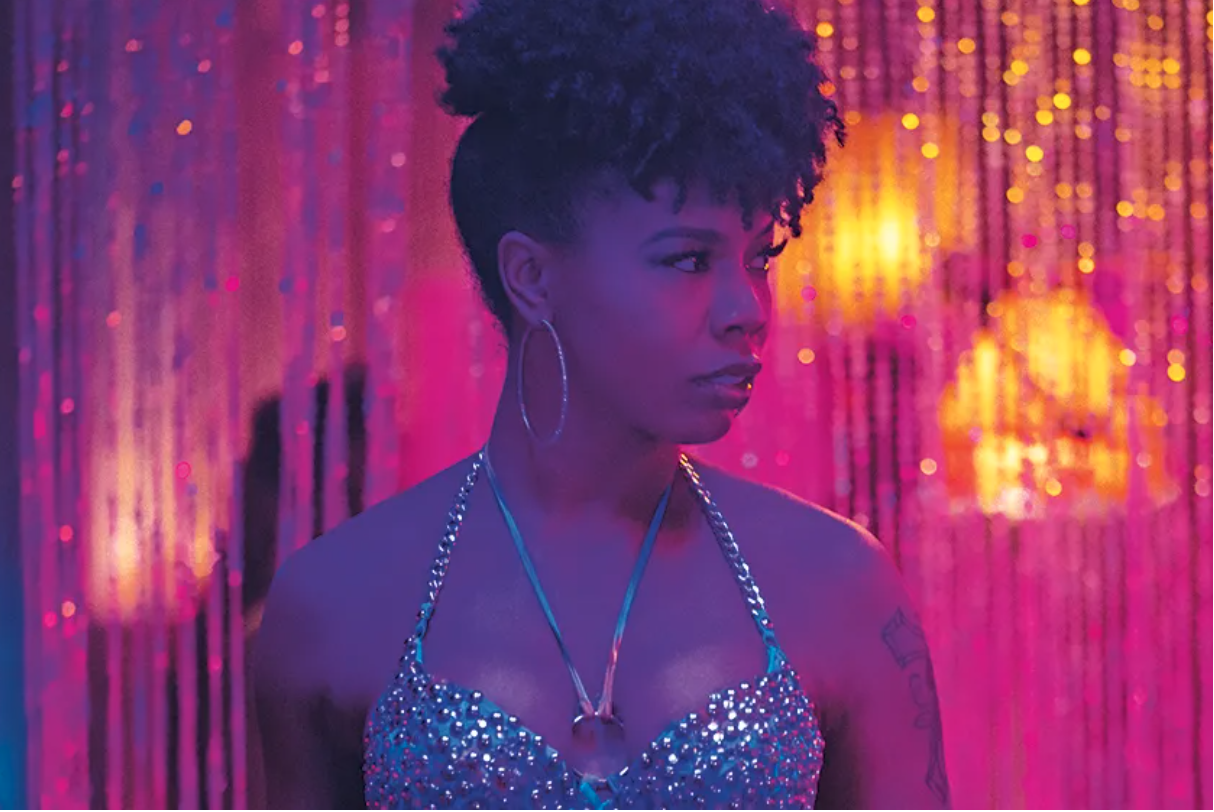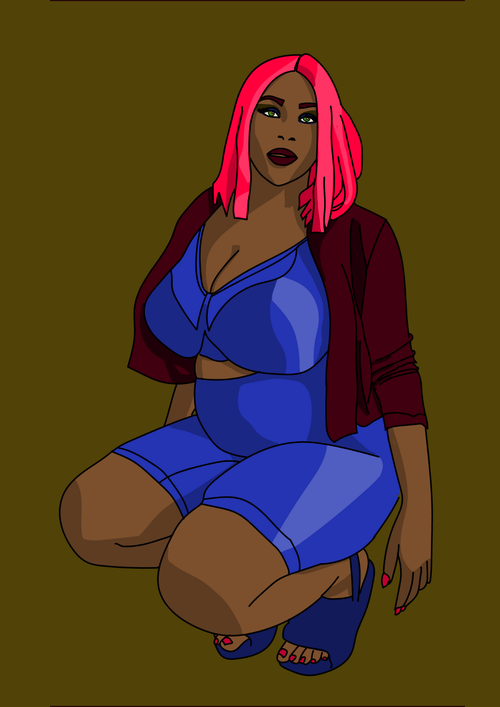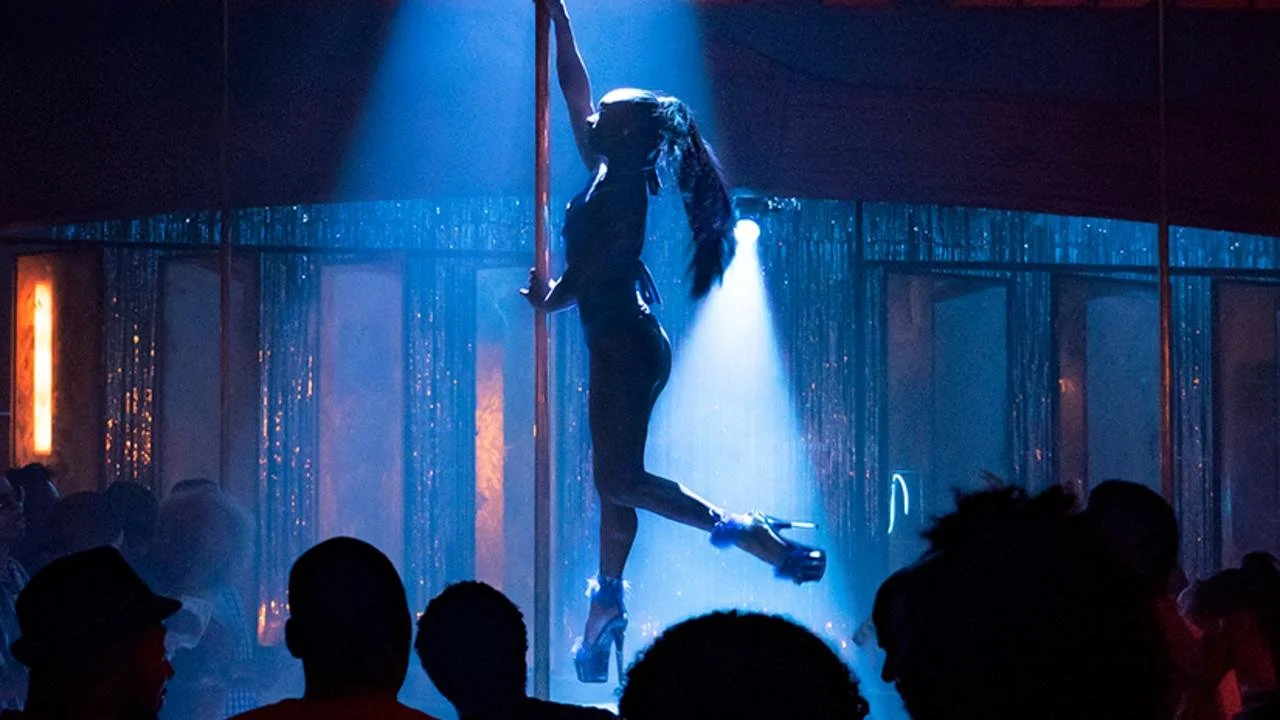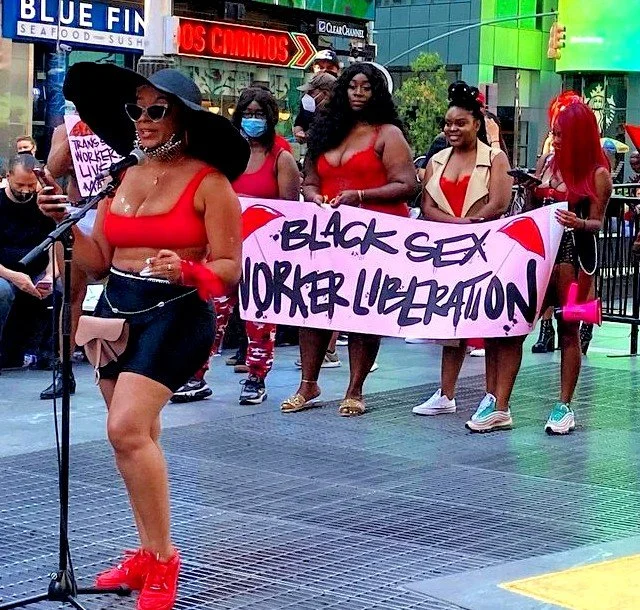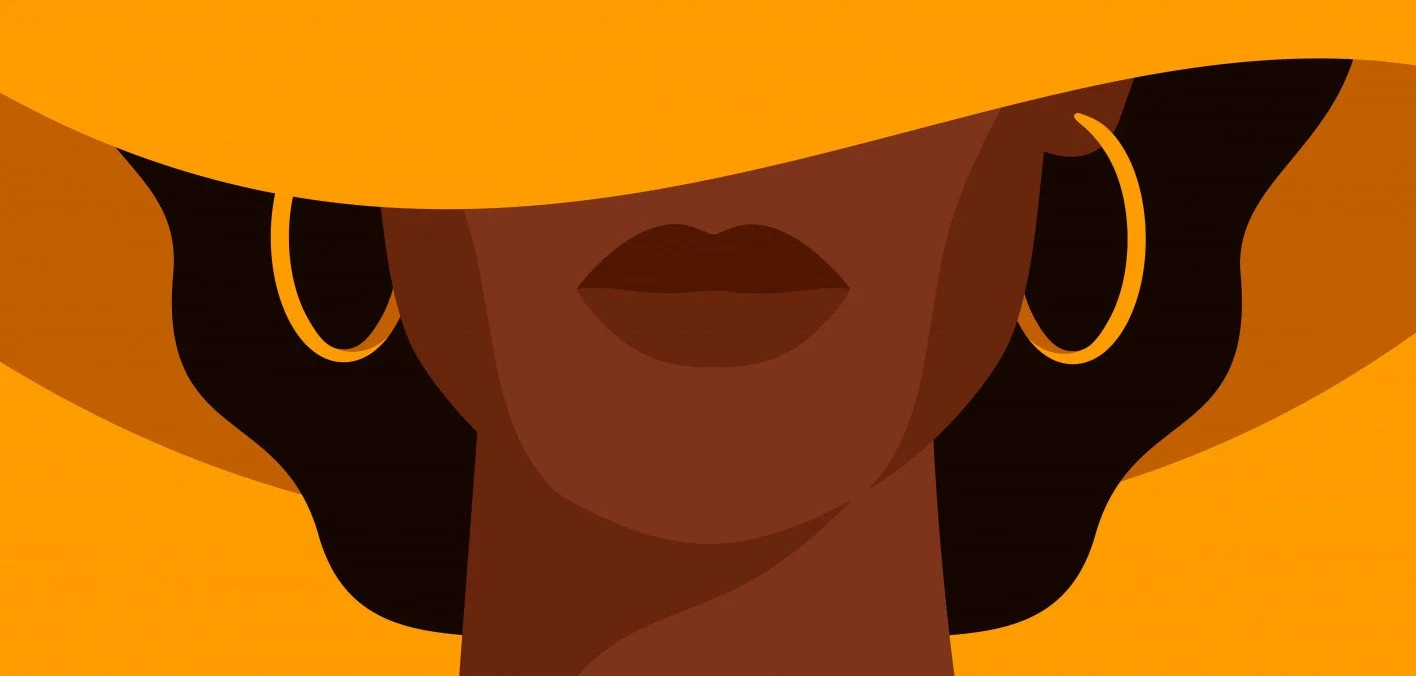How Strip Culture In Atlanta Teaches Us to Reclaim the Economic Impact of Black Femme Bodies
by Tiara Mbonisi
Collage by Tiffany Dian
A year ago I landed in Atlanta, Georgia without my three children, my husband or community. I arrived with four luggages in tow, and although I considered myself a fully realized feminist whose identity could stand alone, I felt like something was missing; like they were missing. I exited Hartsfield-Jackson airport, welcomed by a humidity that hung heavy in the air like a past lover. At 36 years old I had just been accepted into a Women’s, Gender & Sexuality Studies graduate program at Georgia State University.
After more than a decade of working with Black women and children in various capacities, I was finally getting the opportunity to pop my shit on a full ride to become the academic I always wanted to be. The reasons why I came alone are not what this piece is about, but I thought you should know that the stakes were high, and I was without the comfort of my people. My journey through academia before this point had already been an interesting one. I did not complete anything in the timeline folks usually associate with success, and I was not a cookie cutter student. I had no interest in code switching just so folks could respect my intellect.
I am an Oakland girl, cultured and hood adjacent whose family had worked in group homes, nonprofits and prisons with those that society had deemed unfit. So advocating for myself and for the communities I grew up in was simply legacy work. Focusing specifically on Black women was a call to action that came naturally to me. I put on for the ghetto girls, for the hood adjacent, the suburban, the middle and upper class. The American black girls from the city and those from the country. The black girls from the West Indies and those who represent all the many faces of Africa. For the ones that speak pretty on panels and the one weaving spells with their bodies in the back rooms of strip clubs.
I can not speak perfectly for everyone, but I can lend my voice. I am always learning the languages of what it means to be a Black woman, and I’m committed to becoming well versed. I understand that offering my intellectual property to academia was a transaction when I accepted the offer to come to grad school. To be a Black academic is like any good or service Black women offer for sale to make due.
Notes From A Dancer Named Lyrics
Jessica Miglio/Starz
When I saw her, our eyes locked, her gaze was intense, she looked like a Beauty of the Week straight outta Jet Magazine. Her sex appeal was vintage, an effortless 90’s kinda girl though I’m sure she’s Gen-Z. No weave, no plastics, her body was tea; tighter than mines had been in years. Matter of fact, I saw no one in the club that afternoon whose body looked like mine. I’m round, imperfect, some might call it thick, a body much heavier than a freshman 15. Yet although our bodies measured definitely in scale we both held the weight of our womanhood.
I couldn’t hold her gaze, so I casually shifted my eyes down, letting them sink to the sugar rim of my lemon drop and to the appetizers on the table. I thought maybe she could see my insecurities as much as my desire. I wondered what mindset a woman needed to be in, to parade a pussy that pretty around for minimum wage. A few of us from the artist cohort sat there having our midday meal as artists, civic servants and voyeurs watching, and wanting to know more. Woman after woman sat at our table as if it were a throne, honored to chat, to be paid for their intellectual property, and a small opportunity to bring us into their world.
They said at this club they got paid more in the day time shift to talk to gentlemen than to dance. Companionship was easily as enticing as selling any fantasy and here, cattiness and fighting would not be tolerated. Building an etiquette between girls was necessary for business, that having a clique was imperative to get to the bag. Speaking of business, each woman was a sole proprietorship in stilettos. Women, who knew how to talk that talk to investors, whose confidence easily rivaled any man in a boardroom. Their stride communicated “I know what you want, and if you beg I just might give it to you.”
She tells me it’s true that people come to the club to explore their desires, to get their egos stroked, and to decompress. But they also seek her out to find themselves, to process emotions, orientations and identities in a safe space.
Each woman’s knowledge of her own unique assets paid the bills beyond the minimum wage of $5.15 an hour. Being a woman or femme in a patriarchal society is always about transaction, and this was their trade. The art of who is buying and who is selling is something that women in this profession understand intimately. It is much deeper than the modern adage of what women bring to the table when it is quite possible that we sourced the lumber. As a gender often seen as planters, the oak and cedar to build such tables may very well run in our bloodline. If anyone knows the value of what women cultivate with their hands, or what magic we do with our bodies, it is without a doubt femmes who choose to strip who engage in sex work of any kind. And like many of us have told you, sex work is work, “but this love ain’t free no more, baby” so we expect you to pay up whether she’s working at the pyramids, the Blue Flame or The Cheetah Lounge.
Lyrics coworker was an OG in the club at the ripe age of 26, she told me that her brand was venturing into sex therapy. A married couple came to her, wanting to “open up their relationship,” but the wife wasn’t sure if she was attracted to women. Now as a scholar of Women’s, Gender & Sexuality studies I can tell you that sexual attraction lives on a spectrum. That some of our limitations on desire and gender are self imposed preferences, while others are immovable destinations. The wife in this story requests a private session. She needs help exploring if the body of a woman is something she actually desires without the prompting and the pressuring of her husband's gaze. So they continue into the back room.
The dancer talks her through it, she crouches down in a pure squat, exposing where the dark meat of her thighs and salty waters connect. She demands softly from her client: “Look at it. Look at me. How does it make you feel?” She tells me it’s true that people come to the club to explore their desires, to get their egos stroked, and to decompress. But they also seek her out to find themselves, to process emotions, orientations and identities in a safe space. She is an entrepreneur. She is a stripper. She is a coach and therapist in this space.
Starz
I talked to a younger woman that day, she was a pretty brown brown, and was a new hire at the club. She said that she’d tried various minimum wage jobs and decided that dance would be her next venture while she was in school. There is a common misconception of low self-esteem associated with strippers, but there was none with these three. As a feminist it’s a worry that I have knowing that women are navigating a society entrenched in pimp culture. Low self worth emits an energy that sucks confidence out of a room and feeds on trauma, it suffocates everyday women, many who would never take their clothes off to make ends meet.
If anything, the dancers I met made it clear to me that self esteem was paramount to be in a competitive space with other attractive women. Knowing that comparison is the thief of joy, each woman became the expert of her own brand and body. Instead of worrying about how she measured up to the next woman she focused on how she measured the value of her own potential.
Lyrics finally made her way over to the table. I pretended to be unbothered when she came over, though I had been watching her the whole time. Her therapist friend told me she had a podcast entitled Coochie Cocktells and I was excited to ask her about it. More so I was impressed at the entrepreneurial nature of all the women we’d met. She slid into the booth beside me, and explained that her brand was about sex positivity and removing the negative stereotypes associated with sex, pleasure and sexuality. Now, I don’t see a difference between the work she was doing at the club and the work I wanted to do in the academy.
We both wanted to liberate women and be compensated for our work. We also wanted a platform to become thought leaders to give permission for other women to be loud and take up space. I asked her if I could be a guest on her show and she agreed. I decided that this would be a way to immerse myself into her world and learn more. The day of the podcast, I put on a boob positive t-shirt by the designer Denisio Truitt, jean shorts and brown boots.
I was ready for my close up. I walked into a coworking space in downtown Atlanta. The studio was well decorated. Her videographer had just walked in and as she offered me and my guest a drink they set up the cameras and mics to shoot our episode. I marveled at her demeanor on and off stage, a confidence perfectly adjusted to whatever space she was in. I was impressed by the build out of a very well curated brand that includes dance, a podcast and a drink under the same name. She sells a tea that has ingredients like Damiania, ashwagandha and horny goat weed to keep the lady bits slippery and healthy. In my head I said to myself “oh these Atlanta girls don’t play, teach me how to monetize my assets. Teach me the art of transaction.”
Because of these women, I got the opportunity to see sex work as a legitimate industry and a privilege. Viewing sex work from a historical lens, specifically during chattel slavery, where womens’ bodies were non-consensually used to create and sustain a labor force through the guise of pleasure. They had no agency, choice or benefit from their bodies being utilized in this way. The parallels of sex work today juxtaposed with the sex work I am accustomed to hearing about during slavery reminded me of a lesser known narrative about enslaved women from the Georgia sea islands who made money by selling pleasure.
Notes From Charleston, Sc. A Historical Look At Sex Work
Black Sex Worker Liberation
The sex industry is one that has existed in every time period, and in almost every culture, regardless of the social pressures of purity or chastity.
Over the summer I got the opportunity to learn about the history of slavery in Charleston, SC in the late 1800’s. The course had a special focus on celebrating Gullah - Geechi culture whose presence remains intact along the sea islands of South Carolina, Georgia, and Florida. I rode 5 ½ hours to the edges of Charleston with a group of black academics from various walks of life. I watched from the review mirror as Spanish moss hung like tipsy lovers from the necks of live oaks and cypress trees. I thought if only I could get my money right I could afford a Victorian here in the south, if I couldn’t afford one back home in the Bay Area. I wondered how a place so gorgeous managed to hold an ugly history simultaneously.
Often, we tire of hearing and talking about the transatlantic slave trade on American soil, partially because we don’t get the full story. They keep the rebellions, the sweet victories, the unbreakable spirit, and the ingenuity from us. They purposely remind us of our failures and servitude without telling us that the spirit of our hustle was an art form they never quite managed to erase. That slavery itself and its rules were not a monolith in the south. Slavery in this part of the United States had a different energy. The port in Charleston welcomed black folks from Liberia, Angola, Sierra Leone and different parts of the West Indies. The black population during this time were a mix of enslaved and free people.
They commingled with white indentured servants, indigenous people, and upper class white folks whose pockets fattened off their labor. The hospitality industry curated by Black women rivaled the beauty akin to a party scene in Bridgerton. Yet regardless of their station many had hustles and were able to make money off of crops and services even if they were enslaved. They grew rice, sea island cotton, sweet potatoes and indigo. They were a skilled labor force of black smiths, cooks, planters and more. As women, we are always told about the enslaved women who were raped for pleasure or sport; whose bodies supplied the children who would be born into perpetual servitude.
This is quite literally the origin story of sex work for Black women in America. Yet they would have us believe that we never had access to the wealth made by our own bodies. This is a narrative we are accustomed to. They forgot to tell us of the enslaved women in Charleston who sold their sex as a service, who in many ways had agency over their own assets (Morgan 92), this was unique to the marketplace culture of Charleston. Visitors found themselves enthralled into an antebellum red light district, that existed outside the norm of slavery in other parts of the south (Chakrabarti Myers 21). They were women who sold fantasy, who offered pleasure, and who created enterprise at the intersection of their thighs.
The sex industry is one that has existed in every time period, and in almost every culture, regardless of the social pressures of purity or chastity. Both are moral devices of patriarchy and religion to connect shame to this work, so men control the outcome and even have access to the bulk of the profit made off of femme bodies. Whether it is stripping, go-go dancing, selling sex directly, or creating content for Only Fans, women have learned the sexual value of their own bodies. They learn that shame and the necessity of a man to manage their prized assets is a farce. From antiquated Charleston to modern day Atlanta, we know that sex sells.
It is indeed liberatory and feminist for women to create the terms of their work, even as that work operates within a patriarchal paradigm. ATL culture is intrinsically connected to sex work and women's bodies. Strippers are a core tourist attraction in Atlanta, whose influence permeates music, fashion and hospitality. They negotiate their pay with club owners, club moms, security guards and clients to secure the bag. They are just as much a part of the entrepreneurial spirit of Atlanta as any other industry. They are thought leaders and business women, who are a part of a long legacy of femmes who have taken their agency back, whose survival is connected to the economy of their own bodies and the fantasies they weave around them. Black women having the agency and choice to situate themselves to sell sex, fantasy, intellectual property or anything in between is freedom. While this world attempts to consume us in every imaginable way, we set the terms. We all deserve respect, autonomy and protection in whichever roles we choose. The cultural landscape of sex work in Atlanta and beyond is worthy of more attention.
Works Cited
Chakrabarti Myers, Amrita. “Forging Freedom: Black Women and the Pursuit of Liberty in Antebellum Charleston.” The University of North Carolina Press, 2011.
Morgan, Phillip. “Black Life in Eighteenth-century Charleston.” The Institute of Early American Culture, (Williamsburg, Va.);1984.
Tiara Mbonisi is a Women’s, Gender & Sexuality studies scholar, a writer, artist and educator. Connect with her @TiaraMbonisi.


